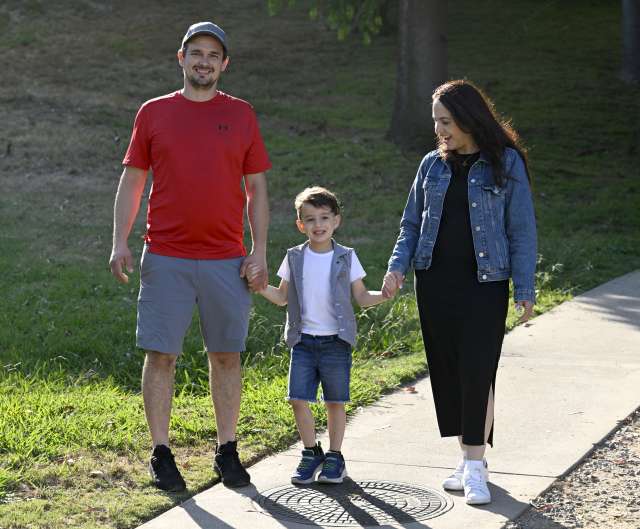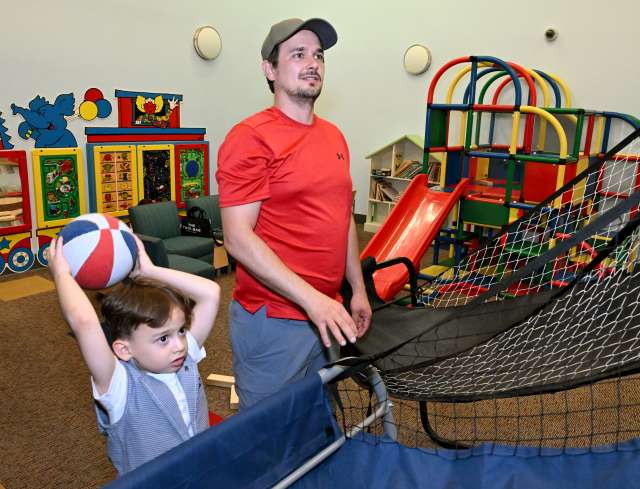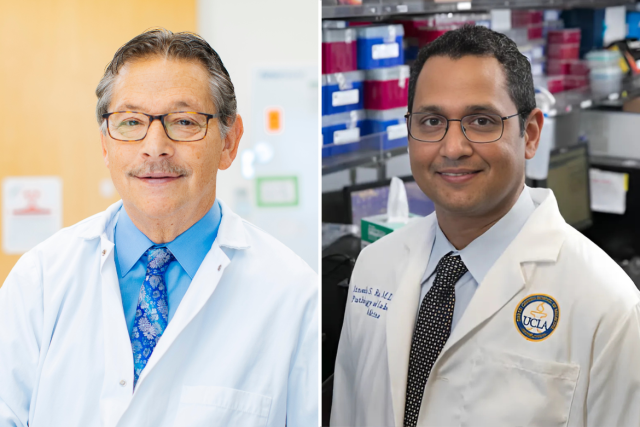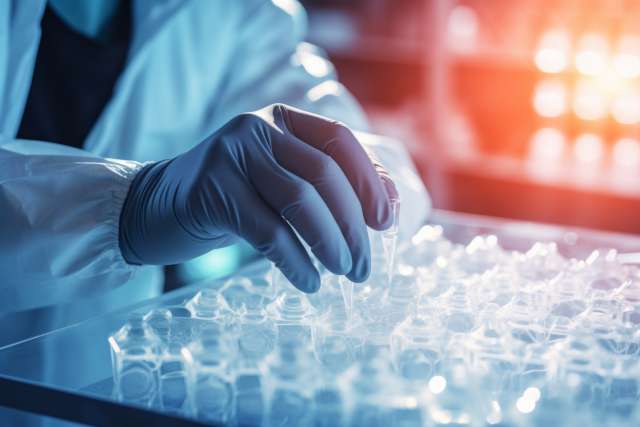Days after their son was born in 2019, Andrea Fernandez and Kamil Guziak learned their new baby had a rare genetic disease and would be lucky to reach his second birthday.
“You’re thinking, ‘How many pictures can I have with him? How many videos can I create?’” Fernandez says. “Every moment we’re just grabbing for those memories.”
The couple, who live in Canada, learned there was a treatment that could potentially cure their son, Jakob Guziak, but regulatory red tape stood in the way.
A pioneering therapy developed at UCLA Health had proven successful in treating children with the condition Jakob had: ADA-SCID (adenosine deaminase-deficient severe combined immunodeficiency), also known as “bubble baby disease.” However, the treatment had been licensed to a company that stalled before approval from the U.S. Food and Drug Administration and the therapy became unavailable to patients.
With treatment options few and often prohibitively expensive, the gene therapy developed at UCLA Health looked like Jakob’s best hope. As the months, then years, ticked by, Fernandez and Guziak kept their son alive with thrice-weekly enzyme injections that cost $13,000 apiece, covered by Canadian health care.
In May of 2024, when Jakob was almost 5, their wait for gene therapy finally ended.
Groundbreaking therapy
ADA-SCID occurs in about 1 in 500,000 newborns worldwide. These babies lack immune protection from viruses, bacteria and fungi, meaning a simple cold could be fatal.
Enzyme injections, like the ones Jakob had been receiving every few days since birth, can shore up a child’s immune system somewhat, but ordinary germs remain a danger. ADA-SCID can also be treated with a bone marrow transplant from a matched sibling donor. But for children like Jakob, who have no siblings, transplant isn’t an option.
Donald Kohn, MD, a member of the Eli and Edythe Broad Center of Regenerative Medicine and Stem Cell Research at UCLA, spent decades coming up with a solution, developing a gene therapy to restore the immune systems of babies with ADA-SCID.
This protocol – which involves extracting a child’s stem cells, modifying them to correct the genetic deficiency and then transplanting them back into the child – was successfully administered during clinical trials to more than 30 children at UCLA Health between 2013 and 2017.
“We had two patients early on where it didn't work and they needed to get a bone marrow transplant,” Dr. Kohn says. “Otherwise, everyone has been absolutely stable now for years: good immune function, healthy, no problems. It's functionally a lifelong cure.”
After this early success, a drug company obtained the license to produce the treatment commercially with FDA approval. But it didn’t happen.
Accessing treatment
By the time Jakob Guziak was born in August 2019, the gene therapy Dr. Kohn developed was no longer available. Fernandez and Guziak heard about a genetic treatment possibility in Italy, but it would cost $1.5 million and require them to move to the country for a minimum of six months. How could they cover such a hefty price tag and survive six months without work?
The couple became researchers, fundraisers and advocates. They connected with other parents of children with ADA-SCID across the globe, sharing experiences and looking for solutions. Fernandez launched a podcast and a social media campaign to share Jakob’s story. She published a children’s book about life in a “bubble”: no playdates, no big family gatherings, no playgrounds, no school; lots of hand-washing and imagination. She spearheaded efforts to bring gene therapies to Canada.

Ultimately, Fernandez rallied other parents to lobby the drug company to return UCLA Health’s treatment protocol so it could be administered again.
“She talked to the Canadian parliament about the issue. She talked to the press. And I think it sort of embarrassed the company to give (the license) back so the treatment could be offered again,” Dr. Kohn says. “She’s the hero who made that available to Jakob.”
Saving Jakob
Bouncy, bright and bilingual in English and Spanish, Jakob looks and acts like a healthy, high-energy kid – playing ping-pong with his dad, laughing and chasing a ball all around the room. His illness is invisible, yet the smallest virus or infection could be deadly.
Jakob hasn’t had any of the usual childhood vaccines – his immune system can’t support them. He hasn’t been to school or looked after by a babysitter. His world has been limited to his Edmonton home, hospitals and doctor’s offices.
“If you see him, you don’t think he looks like a sick child,” Fernandez says. “But there are a lot of internal things we have to do in order to make that happen. There are a lot of sacrifices we have to make.”
Fernandez and Guziak haven’t gone on a date or out to dinner since Jakob was born. Both parents work, with Guziak busy during the week and Fernandez doing shift work on weekends. This means one of them is always with Jakob, homeschooling him and coming up with kid-worthy activities that don’t require physical interaction, all while hoping for the promise of gene therapy.
“You put your life on hold until something comes up,” Guziak says.
Things finally changed when the license for Dr. Kohn’s gene therapy for ADA-SCID was returned to UCLA in 2022. Dr. Kohn spent a year restoring the program and securing a grant to provide the treatment to eight more children, Jakob among them. The funding would cover all the family’s expenses: travel, accommodations, treatment. After years of waiting, Jakob would finally receive the therapy that could repair his immune system and allow him to be as healthy as he looked.
The family’s first trip together – and Jakob’s first experience with public transportation – was their flight to Los Angeles in May 2024, for treatment at UCLA Health. Jakob dressed like a pilot for the adventure.
A new beginning
After a few days in L.A., the family was back in Edmonton. Meanwhile, Jakob’s stem cells were processed to correct the genetic mutation. Jakob doesn’t say much about the treatment, though he proudly shows a visitor the spot near his neck where his stem cells were extracted through a catheter as thick as a spaghetti noodle.
The family returned to UCLA Health in July 2024. Jakob underwent chemotherapy to make room for the treated stem cells, which were transplanted into his veins in a quick, five-minute process.
Then it was back to Edmonton and straight to the hospital, into an isolation room, where he would spend a month recovering as his immune system gradually rebuilt itself. After 30 days, the injections he’d been receiving all his life stopped.
“The process of the injections, the stress, the anxiety, that was our normal,” Fernandez says, “and now we are in a new normal.”
She and Guziak are still adjusting as Jakob’s immune markers continue to climb. They’ve taken him to the park – “when nobody’s around,” Fernandez clarifies. And if his current progress continues, as is anticipated, he’ll start kindergarten in January 2025.
“I don’t think it’s hit us yet,” Guziak says.

Even though the news is all good, the experience isn’t without new anxieties, they say. After spending nearly every moment with Jakob since he was born, he’ll soon be going to school with other children, away from home for hours each day.
“There’s a lot of fears that we will have to prepare ourselves to let go of,” Fernandez says. “It sounds silly, but I’ve been thinking how am I going to get myself into the institution to see him all the time? I’m going to have to volunteer for every single event in order to see my child so I know that he’s fine.”
Dr. Kohn says this adjustment period is common in parents of children with immune deficiencies.
“They become intensely protective because they know that any person sneezing on their child can give them a fatal viral infection,” he says. “It takes them quite some time to relax because their child is now healthy and not at risk.”
The life-changing therapy Jakob received will soon be available to even more children with ADA-SCID. In November 2024, Dr. Kohn received a $14.7 million grant from the California Institute for Regenerative Medicine to develop commercial manufacturing of the protocol, enabling it to be offered beyond UCLA Health.
The prospect is thrilling, he says: “That’s why we go into medicine. We want to make a difference and heal people.”
Each time they treat a child with this gene therapy, Dr. Kohn and his colleagues celebrate.
“We’re high-fiving because we just changed another life,” he says. “It’s just miraculous.”
For Fernandez and Guziak, 2025 will be an extra happy new year. They’re already thinking about all the adventures they can have together as a family.
“It’s not just a new life for Jakob, but it's a new life for us as parents,” Fernandez says. “We get to live again, too.”




